- Home
- W. Somerset Maugham
Selected Masterpieces Page 12
Selected Masterpieces Read online
Page 12
'Oh, I don't believe that. I don't think she's capable of hatred.'
'You're not going to pretend that she loves me.'
'No.'
'Well, what does she feel for me?'
Harry Blane leaned back in his swivel chair and looked at George reflectively.
'Indifference, I should say.'
The colonel gave a little shudder and reddened.
'After all, you're not in love with her, are you?'
George Peregrine did not answer directly.
'It's been a great blow to me not to have any children, but I've never let her see that I think she's let me down. I've always been kind to her. Within reasonable limits I've tried to do my duty by her.'
The lawyer passed a large hand over his mouth to conceal the smile that trembled on his lips.
'It's been such an awful shock to me,' Peregrine went on. 'Damn it all, even ten years ago Evie was no chicken and God knows, she wasn't much to look at. It's so ugly.' He sighed deeply. 'What would you do in my place?'
'Nothing.'
George Peregrine drew himself bolt upright in his chair and he looked at Harry with the stern set face that he must have worn when he inspected his regiment.
'I can't overlook a thing like this. I've been made a laughing-stock. I can never hold up my head again'
'Nonsense,' said the lawyer sharply, and then in a pleasant, kindly manner. 'Listen, old boy: the man's dead; it all happened a long while back. Forget it. Talk to people about Evie's book, rave about it, tell'em how proud you are of her. Behave as though you had so much confidence in her, you knew she could never have been unfaithful to you. The world moves so quickly and people's memories are so short. They'll forget'
'I shan't forget'
'You're both middle-aged people. She probably does a great deal more for you than you think and you'd be awfully lonely without her. I don't think it matters if you don't forget. It'll be all to the good if you can get it into that thick head of yours that there's a lot more in Evie than you ever had the gumption to see.'
'Damn it all, you talk as if I was to blame.'
'No, I don't think you were to blame, but I'm not so sure that Evie was either. I don't suppose she wanted to fall in love with this boy. D'you remember those verses right at the end? The impression they gave me was that though she was shattered by his death, in a strange sort of way she welcomed it. All through she'd been aware of the fragility of the tie that bound them. He died in the full flush of his first love and had never known that love so seldom endures; he'd only known its bliss and beauty. In her own bitter grief she found solace in the thought that he'd been spared all sorrow.'
'All that's a bit above my head, old boy. I see more or less what you mean.'
George Peregrine stared unhappily at the inkstand on the desk. He was silent and the lawyer looked at him with curious, yet sympathetic, eyes.
'Do you realize what courage she must have had never by a sign to show how dreadfully unhappy she was?' he said gently.
Colonel Peregrine sighed.
'I'm broken. I suppose you're right; it's no good crying over spilt milk and it would only make things worse if I made a fuss.'
'Well?'
George Peregrine gave a pitiful little smile.
'I'll take your advice. I'll do nothing. Let them think me a damned fool and to hell with them. The truth is, I don't know what I'd do without Evie. But I'll tell you what, there's one thing I shall never understand till my dying day: What in the name of heaven did the fellow ever see in her?'
Lord Mountdrago
Dr. Audlin looked at the clock on his desk. It was twenty minutes to six. He was surprised that his patient was late, for Lord Mountdrago prided himself on his punctuality; he had a sententious way of expressing himself which gave the air of an epigram to a commonplace remark, and he was in the habit of saying that punctuality is a compliment you pay to the intelligent and a rebuke you administer to the stupid. Lord Mountdrago's appointment was for five-thirty.
There was in Dr Audlin's appearance nothing to attract attention. He was tall and spare, with narrow shoulders and something of a stoop; his hair was grey and thin; his long, sallow face deeply lined. He was not more than fifty, but he looked older. His eyes, pale-blue and rather large, were weary. When you had been with him for a while you noticed that they moved very little; they remained fixed on your face, but so empty of expression were they that it was no discomfort. They seldom lit up. They gave no clue to his thoughts nor changed with the words he spoke. If you were of an observant turn it might have struck you that he blinked much less often than most of us. His hands were on the large side, with long, tapering fingers; they were soft, but firm, cool but not clammy. You could never have said what Dr Audlin wore unless you had made a point of looking. His clothes were dark. His tie was black. His dress made his sallow lined face paler, and his pale eyes more wan. He gave you the impression of a very sick man.
Dr Audlin was a psycho-analyst. He had adopted the profession by accident and practised it with misgiving. When the war broke out he had not been long qualified and was getting experience at various hospitals; he offered his services to the authorities, and after a time was sent out to France. It was then that he discovered his singular gift. He could allay certain pains by the touch of his cool, firm hands, and by talking to them often induce sleep in men who were suffering from sleeplessness. He spoke slowly. His voice had no particular colour, and its tone did not alter with the words he uttered, but it was musical, soft, and lulling. He told the men that they must rest, that they mustn't worry, that they must sleep; and rest stole into their jaded bones, tranquillity pushed their anxieties away, like a man finding a place for himself on a crowded bench, and slumber fell on their tired eyelids like the light rain of spring upon the fresh-turned earth. Dr Audlin found that by speaking to men with that low, monotonous voice of his, by looking at them with his pale, quiet eyes, by stroking their weary foreheads with his long firm hands, he could soothe their perturbations, resolve the conflicts that distracted them, and banish the phobias that made their lives a torment. Sometimes he effected cures that seemed miraculous. He restored speech to a man who, after being buried under the earth by a bursting shell, had been struck dumb, and he gave back the use of his limbs to another who had been paralysed after a crash in a plane. He could not understand his powers; he was of a sceptical turn, and though they say that in circumstances of this kind the first thing is to believe in yourself, he never quite succeeded in doing that; and it was only the outcome of his activities, patent to the most incredulous observer, that obliged him to admit that he had some faculty, coming from he knew not where, obscure and uncertain, that enabled him to do things for which he could offer no explanation. When the war was over he went to Vienna and studied there, and afterwards to Zurich; and then settled down in London to practise the art he had so strangely acquired. He had been practising now for fifteen years, and had attained, in the speciality he followed, a distinguished reputation. People told one another of the amazing things he had done, and though his fees were high, he had as many patients as he had time to see. Dr Audlin knew that he had achieved some very extraordinary results; he had saved men from suicide, others from the lunatic asylum, he had assuaged griefs that embittered useful lives, he had turned unhappy marriages into happy ones, he had eradicated abnormal instincts and thus delivered not a few from a hateful bondage, he had given health to the sick in spirit; he had done all this, and yet at the back of his mind remained the suspicion that he was little more than a quack.
It went against his grain to exercise a power that he could not understand, and it offended his honesty to trade on the faith of the people he treated when he had no faith in himself. He was rich enough now to live without working, and the work exhausted him; a dozen times he had been on the point of giving up practice. He knew all that Freud and Jung and the rest of them had written. He was not satisfied; he had an intimate conviction that all their theory was hocus-pocu
s, and yet there the results were, incomprehensible, but manifest. And what had he not seen of human nature during the fifteen years that patients had been coming to his dingy back room in Wimpole Street? The revelations that had been poured into his ears, sometimes only too willingly, sometimes with shame, with reservations,, with anger, had long ceased to surprise him. Nothing could shock him any longer. He knew by now that men were liars, he knew how extravagant was their vanity; he knew far worse than that about them; but he knew that it was not for him to judge or to condemn. But year by year as these terrible confidences were imparted to him his face grew a little greyer, its lines a little more marked, and his pale eyes more weary. He seldom laughed, but now and again when for relaxation he read a novel he smiled. Did their authors really think the men and women they wrote of were like that? If they only knew how much more complicated they were, how much more unexpected, what irreconcilable elements coexisted within their souls and what dark and sinister contentions afflicted them!
It was a quarter to six. Of all the strange cases he had been called upon to deal with Dr Audlin could remember none stranger than that of Lord Mountdrago. For one thing the personality of his patient made it singular. Lord Mountdrago was an able and a distinguished man. Appointed Secretary for Foreign Affairs when still under forty, now after three years in office he had seen his policy prevail. It was generally acknowledged that he was the ablest politician in the Conservative Party and only the fact that his father was a peer, on whose death he would no longer be able to sit in the House of Commons, made it impossible for him to aim at the premiership. But if in these democratic times it is out of the question for a Prime Minister of England to be in the House of Lords, there was nothing to prevent Lord Mountdrago from continuing to be Secretary for Foreign Affairs in successive Conservative administrations and so for long directing the foreign policy of his country.
Lord Mountdrago had many good qualities. He had intelligence and industry. He was widely travelled, and spoke several languages fluently. From early youth he had specialized in foreign affairs, and had conscientiously made himself acquainted with the political and economic circumstances of other countries. He had courage, insight, and determination. He was a good speaker, both on the platform and in the House, clear, precise, and often witty. He was a brilliant debater and his gift of repartee was celebrated. He had a fine presence: he was a tall, handsome man, rather bald and somewhat too stout, but this gave him solidity and an air of maturity that were of service to him. As a young man he had been something of an athlete and had rowed in the Oxford boat, and he was known to be one of the best shots in England. At twenty-four he had married a girl of eighteen whose father was a duke and her mother a great American heiress, so that she had both position and wealth, and by her he had had two sons. For several years they had lived privately apart, but in public united, so that appearances were saved, and no other attachment on either side had given the gossips occasion to whisper. Lord Mountdrago indeed was too ambitious, too hard-working, and it must be added too patriotic, to be tempted by any pleasures that might interfere with his career. He had, in short, a great deal to make him a popular and successful figure. He had unfortunately great defects.
He was a fearful snob. You would not have been surprised at this if his father had been the first holder of the title. That the son of an ennobled lawyer, a manufacturer, or a distiller should attach an inordinate importance to his rank is understandable. The earldom held by Lord Mountdrago's father was created by Charles II, and the barony held by the first Earl dated from the Wars of the Roses. For three hundred years the successive holders of the title had allied themselves with the noblest families of England. But Lord Mountdrago was as conscious of his birth as a nouveau riche is conscious of his money. He never missed an opportunity of impressing it upon others. He had beautiful manners when he chose to display them, but this he did only with people whom he regarded as his equals. He was coldly insolent to those whom he looked upon as his social inferiors. He was rude to his servants and insulting to his secretaries. The subordinate officials in the government offices to which he had been successively attached feared and hated him. His arrogance was horrible. He knew that he was a great deal cleverer than most of the persons he had to do with, and never hesitated to apprise them of the fact. He had no patience with the infirmities of human nature. He felt himself born to command and was irritated with people who expected him to listen to their arguments or wished to hear the reasons for his decisions. He was immeasurably selfish. He looked upon any service that was rendered him as a right due to his rank and intelligence and therefore deserving of no gratitude. It never entered his head that he was called upon to do anything for others. He had many enemies: he despised them. He knew no one who merited his assistance, his sympathy, or his compassion. He had no friends. He was distrusted by his chiefs, because they doubted his loyalty; he was unpopular with his party, because he was overbearing and discourteous; and yet his merit was so great, his patriotism so evident, his intelligence so solid, and his management of affairs so brilliant that they had to put up with him. And what made it possible to do this was that on occasion he could be enchanting: when he was with persons whom he considered his equals, or whom he wished to captivate, in the company of foreign dignitaries or women of distinction, he could be gay, witty, and debonair; his manners then reminded you that in his veins ran the same blood as had run in the veins of Lord Chesterfield; he could tell a story with point, he could be natural, sensible, and even profound. You were surprised at the extent of his knowledge and the sensitiveness of his taste. You thought him the best company in the world; you forgot that he had insulted you the day before and was quite capable of cutting you dead the next.
Lord Mountdrago almost failed to become Dr Audlin's patient. A secretary rang up the doctor and told him that his lordship, wishing to consult him, would be glad if he would come to his house at ten o'clock on the following morning. Dr Audlin answered that he was unable to go to Lord Mountdra-go's house, but would be pleased to give him an appointment at his consulting-room at five o'clock on the next day but one. The secretary took the message and presently rang back to say that Lord Mountdrago insisted on seeing Dr Audlin in his own house and the doctor could fix his own fee. Dr. Audlin replied that he only saw patients in his consulting-room and expressed his regret that unless Lord Mountdrago was prepared to come to him he could not give him his attention. In a quarter of an hour a brief message was delivered to him that his lordship would come not next day but one, but next day, at five.
When Lord Mountdrago was then shown in he did not come forward, but stood at the door and insolently looked the doctor up and down. Dr Audlin perceived that he was in a rage; he gazed at him, silently, with still eyes. He saw a big heavy man, with greying hair, receding on the forehead so that it gave nobility to his brow, a puffy face with bold regular features and an expression of haughtiness. He had somewhat the look of one of the Bourbon sovereigns of the eighteenth century.
'It seems that it is as difficult to see you as a Prime Minister, Dr Audlin. I'm an extremely busy man.'
'Won't you sit down?' said the doctor.
His face showed no sign that Lord Mountdrago's speech in any way affected him. Dr Audlin sat in his chair at the desk. Lord Mountdrago still stood and his frown darkened.
'I think I should tell you that I am His Majesty's Secretary for Foreign Affairs,' he said acidly.
'Won't you sit down?' the doctor repeated.
Lord Mountdrago made a gesture, which might have suggested that he was about to turn on his heel and stalk out of the room; but if that was his intention he apparently thought better of it. He seated himself. Dr Audlin opened a large book and took up his pen. He wrote without looking at his patient.
'How old are you?'
'Forty-two.'
'Are you married?'
'Yes.'
'How long have you been married?'
'Eighteen years.'
'Have you any ch
ildren?'
'I have two sons.'
Dr Audlin noted down the facts as Lord Mountdrago abruptly answered his questions. Then he leaned back in his chair and looked at him. He did not speak; he just looked, gravely, with pale eyes that did not move.
'Why have you come to see me?' he asked at length.
'I've heard about you. Lady Canute is a patient of yours, I understand. She tells me you've done her a certain amount of good.'
Dr Audlin did not reply. His eyes remained fixed on the other's face, but they were so empty of expression that you might have thought he did not even see him.
'I can't do miracles,' he said at length. Not a smile, but the shadow of a smile flickered in his eyes. 'The Royal College of Physicians would not approve of it if I did.'
Lord Mountdrago gave a brief chuckle. It seemed to lessen his hostility. He spoke more amiably.
'You have a very remarkable reputation. People seem to believe in you.'
'Why have you come to me?' repeated Dr Audlin.
Now it was Lord Mountdrago's turn to be silent. It looked as though he found it hard to answer. Dr Audlin waited. At last Lord Mountdrago seemed to make an effort. He spoke.
'I'm in perfect health. Just as a matter of routine I had myself examined by my own doctor the other day, Sir Augustus Fitzherbert, I daresay you've heard of him, and he tells me I have the physique of a man of thirty. I work hard, but I'm never tired, and I enjoy my work. I smoke very little and I'm an extremely moderate drinker. I take a sufficiency of exercise and I lead a regular life. I am a perfectly sound, normal, healthy man. I quite expect you to think it very silly and childish of me to consult you.'
Dr Audlin saw that he must help him.
'I don't know if I can do anything to help you. I'll try. You're distressed?'
Lord Mountdrago frowned.
'The work that I'm engaged in is important. The decisions I am called upon to make can easily affect the welfare of the country and even the peace of the world. It is essential that my judgement should be balanced and my brain clear. I look upon it as my duty to eliminate any cause of worry that may interfere with my usefulness.'

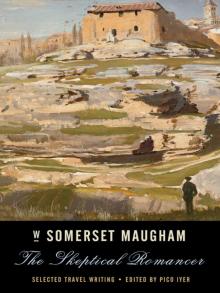 The Skeptical Romancer: Selected Travel Writing
The Skeptical Romancer: Selected Travel Writing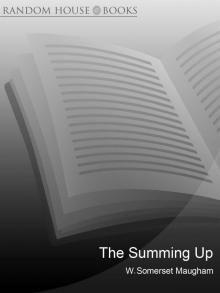 The Summing Up
The Summing Up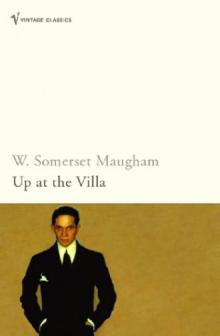 Up at the Villa
Up at the Villa The Razor's Edge
The Razor's Edge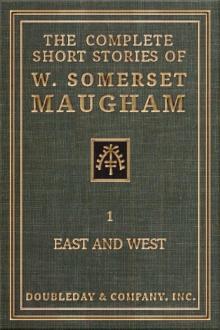 The Complete Short Stories of W. Somerset Maugham: East and West (Vol. 1 of 2))
The Complete Short Stories of W. Somerset Maugham: East and West (Vol. 1 of 2))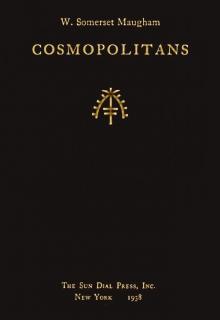 Cosmopolitans
Cosmopolitans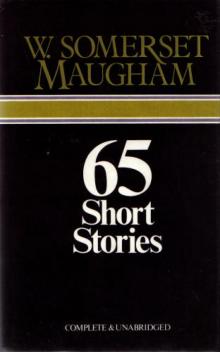 65 Short Stories
65 Short Stories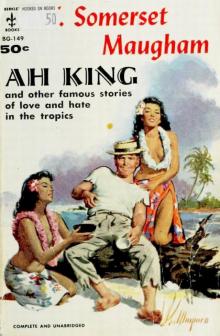 Ah King (Works of W. Somerset Maugham)
Ah King (Works of W. Somerset Maugham)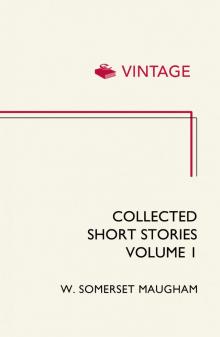 Collected Short Stories: Volume 1
Collected Short Stories: Volume 1 Collected Short Stories Volume 2
Collected Short Stories Volume 2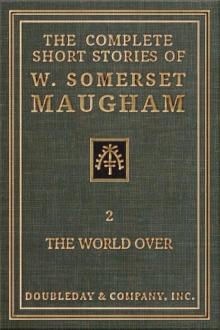 The Complete Short Stories of W. Somerset Maugham - II - The World Over
The Complete Short Stories of W. Somerset Maugham - II - The World Over Collected Short Stories Volume 4
Collected Short Stories Volume 4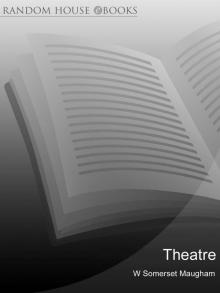 Theatre
Theatre Short Stories
Short Stories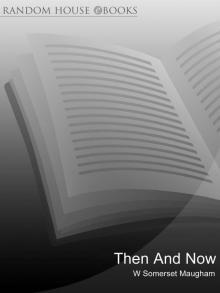 Then and Now
Then and Now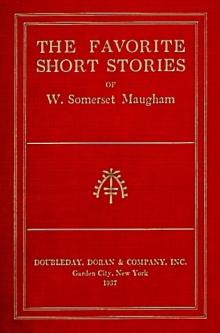 The Favorite Short Stories of W. Somerset Maugham
The Favorite Short Stories of W. Somerset Maugham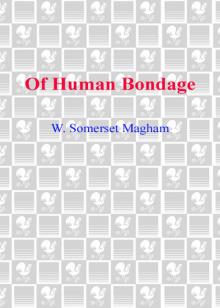 Of Human Bondage
Of Human Bondage The Magician
The Magician The Great Exotic Novels and Short Stories of Somerset Maugham
The Great Exotic Novels and Short Stories of Somerset Maugham A Writer's Notebook
A Writer's Notebook Christmas Holiday
Christmas Holiday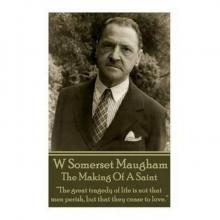 The Making of a Saint
The Making of a Saint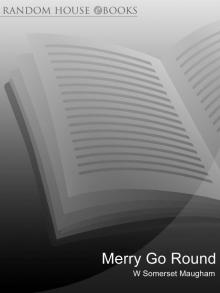 Merry Go Round
Merry Go Round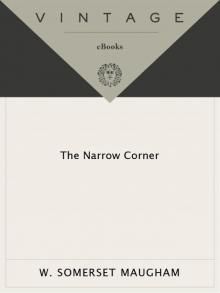 The Narrow Corner
The Narrow Corner Collected Short Stories Volume 3
Collected Short Stories Volume 3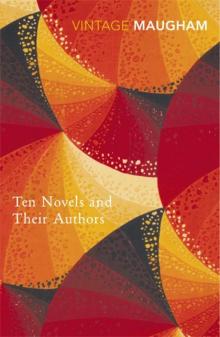 Ten Novels and Their Authors
Ten Novels and Their Authors Ashenden
Ashenden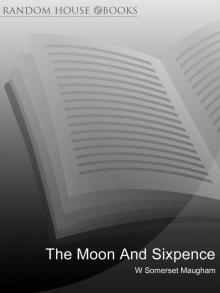 The Moon and Sixpence
The Moon and Sixpence Cakes and Ale
Cakes and Ale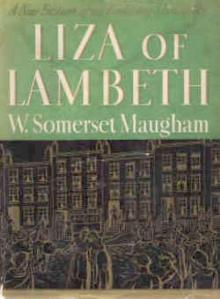 Liza of Lambeth
Liza of Lambeth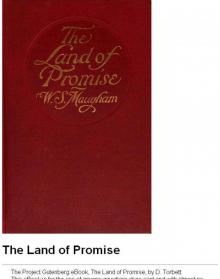 The Land of Promise: A Comedy in Four Acts (1922)
The Land of Promise: A Comedy in Four Acts (1922) A Writer's Notebook (Vintage International)
A Writer's Notebook (Vintage International)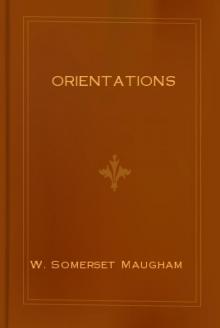 Orientations
Orientations Selected Masterpieces
Selected Masterpieces Mrs Craddock
Mrs Craddock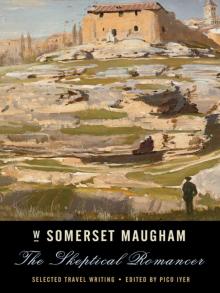 The Skeptical Romancer
The Skeptical Romancer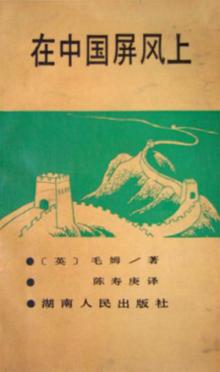 On a Chinese Screen
On a Chinese Screen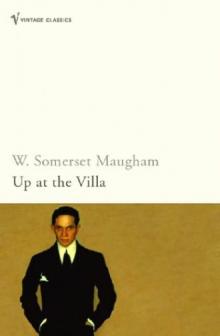 (1941) Up at the Villa
(1941) Up at the Villa The Great Novels and Short Stories of Somerset Maugham
The Great Novels and Short Stories of Somerset Maugham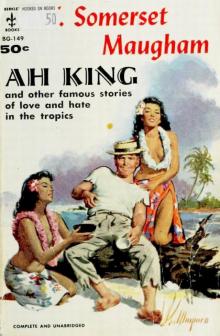 Ah King
Ah King The Explorer
The Explorer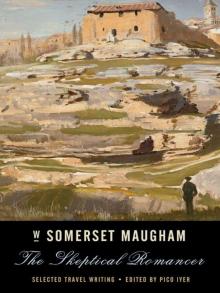 The Skeptical Romancer: Selected Travel Writing (Vintage Departures)
The Skeptical Romancer: Selected Travel Writing (Vintage Departures)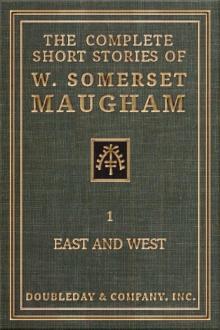 The Complete Short Stories of W. Somerset Maugham - I - East and West
The Complete Short Stories of W. Somerset Maugham - I - East and West